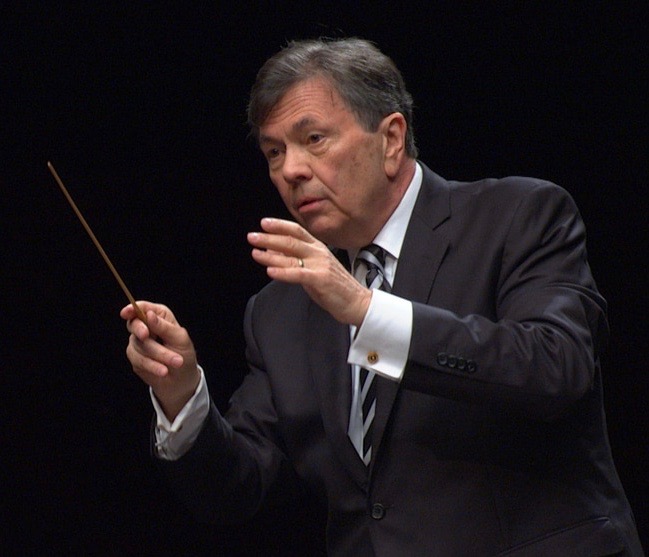Schwarz, Frost Symphony do Copland proud in glitch-ridden streamed concert

Gerard Schwarz conducted the Frost Symphony Orchestra in a livestreamed concert from Gusman Concert Hall Friday night.
Even in our pandemic-plagued era, Gerard Schwarz can be counted on to present stimulating programming. On Friday night Schwarz led the Frost Symphony Orchestra in a concert of 20th century works that verged from the classic and familiar to a major score by a neglected master and an interesting vignette from a composer who bridged previous centuries.
Played before a small audience of students and faculty at Gusman Concert Hall on the University of Miami campus, the program was streamed on YouTube, where it was reviewed. Unfortunately, technical problems in the program’s second half marred the transmission. The concert remains available for free viewing on Youtube.
Played by a relatively small ensemble, Debussy’s Prelude to the Afternoon of a Faun emerged with instrumental textures clear and transparent. Despite the distancing of players, Schwarz managed to achieve well-blended execution. The agile solo flute and harp were especially strong. Still, the conductor’s straightforward approach lacked the sensuous palette that conveys musical impressionism.
Aaron Copland’s Appalachian Spring is a bona fide American classic. The original 1944 ballet was scored for 13 musicians. In 1945 Copland created a suite of excerpts for large symphony orchestra which has been widely performed. That familiar version can seem bloated and top heavy with brass, while the original ballet scoring allows the music’s folkish Americana charm to shine through.
Schwarz opted for a compromise version for 27 players, hewing closely to Copland’s initial instrumentation – strings, flute, clarinet, bassoon and piano. This hybrid edition worked beautifully on every count. The important keyboard line had necessary clarity and the winds’ role was unimpeded by soupy strings.
Schwarz is a master of this American repertoire and his conducting had the stamp of authority with admirable pacing, a sense of balance and idiomatic flair. Following the lyrical introduction, string attacks were vigorous and precise in the ensuing allegro section. The Shaker variations (based on the song “Simple Gifts”) were taken at a sprightly clip with sharp contrasting of dynamics. Broadly shaped and eloquent, the epilogue capped an outstanding performance.
Following intermission there appeared to be problems with the wi-fi transmission. The picture and sound froze at times. At others a double image appeared on the computer screen. A check of the Youtube link Saturday morning revealed the same issues still existed on the video, suggesting the problems were at the source rather than with the platform’s servers.
Under those circumstances, the impressions of that portion of the concert are necessarily compromised and incomplete. Composer Alvin Singleton was viewing the stream to hear his 1988 composition Eine Ist Stück Stoff. (Roughly translated as “an idea is a piece of cloth,” this score was played in place of After Choice, the originally scheduled Singleton composition.)
Commissioned by the American Music Ensemble Vienna, the seven-minute miniature is dedicated to the memory of writer James Baldwin and composer Gustav Mahler. In many ways, although mostly slow, the piece recalls some of Mahler’s nightmarish scherzos. A fractured waltz theme is set in conflict with a blues melody, the fusion or lack thereof becoming quite intense. While the composer could not have been happy with the sound and picture going in and out, he must have been pleased with the soulful depth and strength of Schwarz and the string contingent’s reading (or what one could hear of it).
Paul Hindemith’s Concert Music for Strings and Brass was a major revival and a challenge for the players. From the 1940’s through the 60’s Hindemith was one of the most often played contemporary composers. (A musical polymath, he was also a fine conductor, excellent violist, distinguished teacher and founder of the first American period instrument ensemble at Yale.) With the exception of the Symphonic Metamorphosis on Themes of Weber, Hindemith’s orchestral works now rarely appear on the programs of major symphonic ensembles and his chamber works are even less likely to be encountered. That is unfortunate because his scores are intelligently conceived, replete with invention and carry forward the great Germanic tradition.
The contrapuntal writing in the movement, 18-minute Concert Music (written in 1930 for the 50th anniversary of the Boston Symphony Orchestra) harkens back to Bach. Elongated string themes contrast with the angular fanfare-like brass proclamations. A touch of jazz inhabits the coda. The entire work represents Hindemith at his best and deserves continued performance.
Employing multiple horns, trumpets, trombones and tuba in addition to full strings, the thorny instrumental writing is difficult for any orchestra, much less student musicians. There were some horn mishaps in the first movement but, as far as could be discerned from the shaky transmission, the playing was remarkably secure and Schwarz’s taut command had the full measure of the score. Hopefully, when concert presentations return to normal after the pandemic, he will reschedule this work and continue to explore Hindemith’s symphonic output.
Posted in Performances
Leave a Comment
Sat Nov 21, 2020
at 1:18 pm
No Comments